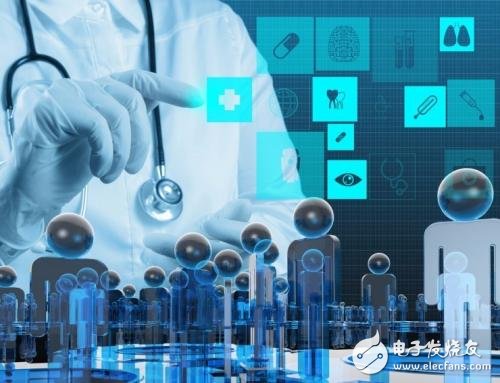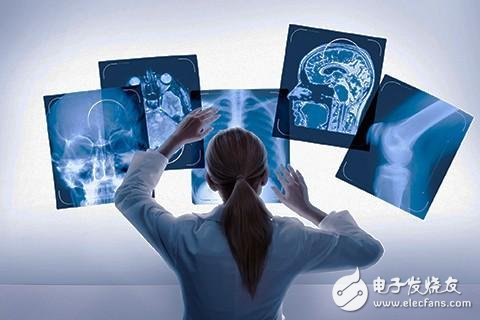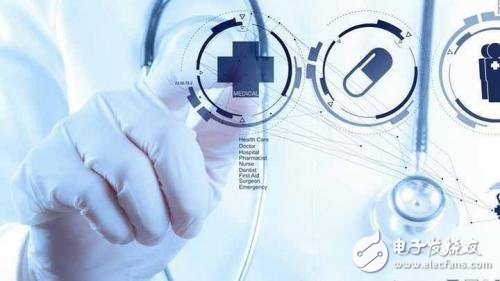With the development of medical artificial intelligence, the application scenarios are gradually diversified. At present, the medical fields in which AI participates include abdominal medical image processing systems for analyzing abdominal tumors, precise radiofrequency ablation liver cancer surgery, ultrasound robots, and intelligent diagnostic aid systems for child growth retardation. At the same time, providing doctors with intelligent medical tools and clinical decision support systems is also the main direction of artificial intelligence in the medical field.
Data is still a constraint to the development of artificial intelligence. On March 23, at the 2018 China Hospital Information Network Conference, Yang Jijiang, deputy director of the Web and Software Technology Research Center of the Information Technology Research Institute of Tsinghua University, said, “Data is the basic material of artificial intelligence.†The complexity of the medical scene, the decision-making process Complexity, so that more AI+ medical companies are not limited to the development of algorithms, but gradually return to data, paying attention to data collection and management.

In the application of artificial intelligence in the medical field, Professor Kong Dexing of Zhejiang University School of Mathematics introduced that it mainly includes AI+ adjuvant therapy, AI+ medical imaging, AI+ precision surgery, AI+ drug mining, and AI+ health management products such as virtual nurses.
Yang Jijiang said that in some European and American countries, artificial intelligence has been applied in the fields of self-monitoring and prevention, early detection of dementia, diagnosis and treatment of pancreatic cancer, and ophthalmologic imaging.
In the field of AI-assisted care, the typical case is IBM Watson. As an artificial intelligence cloud platform developed by IBM, Watson can help oncologists or clinical teams make treatment decisions. Since March 2017, Baiyang Intelligent Technology has obtained the exclusive distribution rights of Watson for oncology in the Chinese market. At present, the Watson Cancer Consultation Center has been deployed in 29 top three hospitals or institutions in China.
In addition, AI Auxiliary Medical has made progress in practical applications in many fields. Kong Dexing introduced that the “abdominal medical image processing system†has been developed in China and has been successfully applied in many hospitals. For example, a 37-year-old male patient was diagnosed with advanced pancreatic head tumors, and the tumor invaded the large blood vessels, which was considered to be unresectable. However, it was found through the above system that the tumor did not invade the large blood vessels and was only partially compressed and could be surgically removed. As a result, the case was successfully operated and the postoperative recovery was good. Similarly, such systems have saved the lives of many patients.

Based on artificial intelligence, the application of ultrasonic robots is more extensive. After obtaining the qualified image, the ultrasonic robot performs automatic screening, intelligent diagnosis, assists in designing the surgical plan, and evaluates the efficacy. Kong Dexing and his collaborators have established a database of more than 24,000 samples including ultrasound imaging and pathology data. At the same time, in the computing environment supported by Intel, the DE ultrasound robot was developed using deep learning algorithms. In 2016, the DE ultrasound robot won in the human-machine "war" for ultrasound image recognition and diagnosis of thyroid nodules.
Kong Dexing introduced that the average accuracy of ultrasound robots to determine whether there are thyroid nodules can reach 95%, and the average accuracy of judging benign malignancy can reach more than 85%.
There is no shortage of powerful intruders in the field of medical artificial intelligence. For example, Tao Xiaodong, general manager of Keda Xunfei Smart Medical BU, told reporters that Xunfei Image has supported online chest CT pulmonary nodule detection and mammography, and several other diseases will complete artificial intelligence-assisted diagnosis and development. .
Fan Wei, director of the Ali Health Artificial Intelligence Laboratory, said that Ali Health's medical AI “Doctor You†is based on promoting the overall development of medical AI. On March 23, Huige Medical Group, which was jointly established by Mayo Medical Group and Gaochun Capital, also participated in the conference. Its “Every Clinical Decision Support System†comes from the combination of artificial intelligence and big data.
Regression data value is the keyFor AI Healthcare, a single algorithm development now seems difficult to support the return of the value of a company's data.
“Actually, artificial intelligence is an expression of knowledge.†Yang Jijiang said that artificial intelligence is actually an interdisciplinary subject, which is not only a branch of computer science, but also psychology, philosophy and linguistics. If the research institution or company simply studies the algorithm, it is difficult to apply it. The combination of data from different sources and algorithms is the foundation of artificial intelligence.
Natural language learning, deep learning, virtual assistants, etc. are all specific research areas of AI. In medical applications, the application of image analysis is also extensive.
Yang Jijiang believes that from the development stage, artificial intelligence from the early reasoning to the latter data drive, the data is the most important. For example, companies with AI+ medical imaging have discussed with industry experts and started to return to data, spending a lot of effort on data collection and data management, rather than “illusory†to diagnose.

For AI medical care, the importance of data is self-evident. The diagnosis or presumption that AI does on a small sample set is considered to be an unsustainable pattern, because once you expand a little more, change a disease, change a place, the result may be biased, and the correct rate is reduced.
"Why does artificial intelligence suddenly break out? In fact, this has something to do with the development of big data. We have a lot of data on hand now, but if we don't use it effectively, it will have no value." Yang Jijiang said.
Yang Jijiang had more than 200,000 experiences after cleaning 4 million pieces of data. The 2 million ophthalmology data obtained from a hospital was almost 200,000 after cleaning. As the basic material of AI medical care, the accuracy and quality of the data is very important. But "clean" data is not easy to obtain and requires a lot of work.
Even if the amount of data is large enough, AI Medical can't guarantee 100% accuracy in the face of each individual's difference. Once the problem occurs, it is misdiagnosed and missed. Therefore, many participants also expressed a similar view that the role of artificial intelligence in the medical field is still auxiliary.
For the auxiliary system of clinical decision-making, a large number of medical guidelines and doctors' experience and wisdom are combined to make decision-making suggestions for the treatment target and the real-time effect of treatment, which greatly improves the comprehensive decision-making diagnosis level of the department.
Mindray found that there is a close relationship between the blood oxygen parameters of the light signal and the ECG parameters of the electrical signal. The two data are “screwed togetherâ€. Under the multi-parameter joint analysis, the accuracy of heart rate and pulse monitoring is greatly improved, and the accuracy of the alarm is greatly enhanced. The result of this "smart alarm" is to reduce the number of fatal arrhythmia false alarms by 65% ​​and the number of other arrhythmia false alarms by 50%. At the same time, the heart rate accuracy is increased by 30% and the pulse rate accuracy is increased by 30%.
Comments: But as of now, no one can guarantee that artificial intelligence can achieve 100% accuracy, but which doctor can guarantee that he can achieve 100% accuracy? If people can't reach it, they need AI to be reached. Is it too demanding for artificial intelligence? At this stage, artificial intelligence is used to improve the efficiency of data analysis and utilization in the process of medical treatment, and providing reference for doctors' analysis and judgment is the greatest contribution. Others can slowly improve in practice.
Twinkle System Technology Co Ltd , https://www.pickingbylight.com